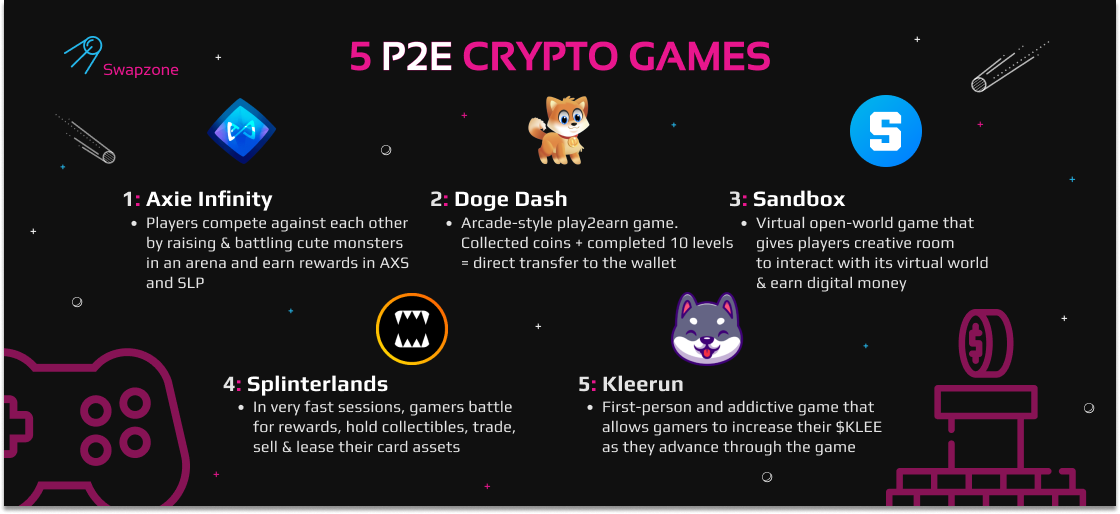Unlock massive benefits when you play to earn rewards in your most played games
Unlock massive benefits when you play to earn rewards in your most played games
Blog Article
Just How Play-to-Earn Benefits Are Changing the Video Gaming Experience
The advent of Play-to-Earn benefits marks a substantial evolution in the pc gaming landscape, shifting the emphasis from mere amusement to genuine financial participation. This improvement invites players to spend not only their time however also their monetary sources, fostering a feeling of possession and deeper involvement within game environments. As varied demographics embrace these chances, brand-new communities emerge, obscuring the lines between leisure and financial investment. Yet, this transition increases crucial questions regarding sustainability and the future of video gaming. What ramifications could this have for the market and its gamers?

Advancement of Gaming Designs
The landscape of video gaming has actually undergone a significant improvement over the years, advancing from traditional pay-to-play models to a lot more cutting-edge structures that focus on customer engagement and monetization. Initially, games were mostly offered as standalone items, calling for ahead of time settlements for accessibility. This model, while reliable in creating earnings, often limited player communication and area structure.

In the last few years, the surge of blockchain modern technology has introduced play-to-earn systems that basically change video gaming dynamics. These versions not only offer a system for gamers to earn incentives however likewise equalize the video gaming economic climate, allowing customers to own in-game properties. This development reflects a broader fad in the direction of community-driven experiences, where designers and players collaborate in forming the video gaming landscape, ultimately redefining exactly how value is viewed in the pc gaming industry.
Advantages of Play-to-Earn Systems
Opening new opportunities for player interaction, play-to-earn systems offer a variety of benefits that basically enhance the pc gaming experience. These systems empower gamers by providing concrete incentives for their effort and time, cultivating a sense of possession and investment in the game. This inherent motivation drives players to involve more deeply, checking out video game mechanics and neighborhoods that they could otherwise ignore.
Moreover, play-to-earn designs equalize gaming by leveling the playing area. Gamers from various backgrounds can take advantage of their skills and imagination, making it possible for new entrants to experience monetary advantages that were traditionally scheduled for designers and authors. This shift encourages a much more varied gamer base, improving the gaming environment with diverse viewpoints and experiences.
In addition, play-to-earn systems advertise area structure, as gamers work together and contend within decentralized settings. This communication grows social connections that improve pleasure and retention, as players feel a sense of belonging.
Lastly, these systems can lead to increased longevity for games, as continuous player involvement usually translates right into continual rate of interest and financial investment in future versions or expansions, guaranteeing a vibrant gaming landscape.
Financial Influence On Gamers
Play-to-earn systems not only enhance player involvement yet additionally have substantial economic implications for people included. These platforms allow gamers to monetize their time and skills, transforming gaming from a leisure activity into a viable revenue source. As gamers make copyright or in-game assets that can be traded or marketed in real-world markets, they get financial motivations that can dramatically affect their personal economic climates.
The financial design cultivates a brand-new wave of entrepreneurship, as players can buy various pc gaming ecological communities or establish strategies to maximize their profits. This possibility for income generation brings in a diverse group, including those in regions with minimal task possibilities - play to earn rewards. As a result, several players are currently viewing video gaming not simply as enjoyment yet as a pathway to economic empowerment.
Nonetheless, it is important to identify the volatility related to cryptocurrencies and the capacity for market variations to affect profits. Gamers must browse these threats while balancing their video gaming and economic tasks. In general, the economic influence on gamers is extensive, reshaping their relationship with video gaming and opening avenues for riches production in an increasingly electronic economic situation.
Community Building in P2E Games

Gamers in P2E atmospheres often create guilds or partnerships, producing networks that assist in source sharing, calculated preparation, and shared assistance. These teams commonly participate in participating goals or competitors, better reinforcing their bonds and improving the general video gaming experience. Furthermore, community-driven events, such as tournaments and celebrations, offer to join gamers, foster camaraderie, and incentivize More about the author involvement.
Moreover, programmers proactively engage with their communities, integrating comments and tips that form video game advancement. This collective method not just encourages gamers yet likewise makes sure that games advance abreast with player interests, boosting fulfillment and long-term involvement. Eventually, community structure in P2E games is not just an attribute; it is a fundamental aspect that changes the gaming landscape right into a much more comprehensive and interactive atmosphere.
Future Fads in Video Gaming
The gaming market's evolution is positioned to embrace a number of transformative trends that will redefine gamer interaction and experience. Among the most substantial trends is the assimilation of expert system (AI) to produce even more customized pc gaming environments. AI can examine gamer habits and choices, allowing designers to customize experiences that resonate deeply with private customers.
Furthermore, the development of virtual and enhanced fact (VR/AR) technologies is readied to boost immersion, offering players the capability to connect with digital worlds in unmatched means. This will not only raise gameplay yet also foster social anchor connections, as players can work together and complete in common environments.
Furthermore, the increase of blockchain modern technology will remain to influence the pc gaming landscape, enabling true ownership of in-game possessions with non-fungible symbols (NFTs) This trend will equip gamers to trade and monetize their pc gaming experiences, further blurring the lines between pc gaming and investment.
Final Thought
To conclude, the appearance of play-to-earn rewards represents an essential makeover within the pc gaming sector. By incorporating financial motivations right into gameplay, gamers are significantly involved, cultivating a feeling have a peek at this website of possession and investment in electronic settings. Additionally, the democratization of gaming facilitates diverse engagement, advertising cooperation and area building. As these trends remain to evolve, the blurred lines in between entertainment and financial investment will likely redefine the future of gaming, shaping brand-new experiences for gamers worldwide.
Report this page